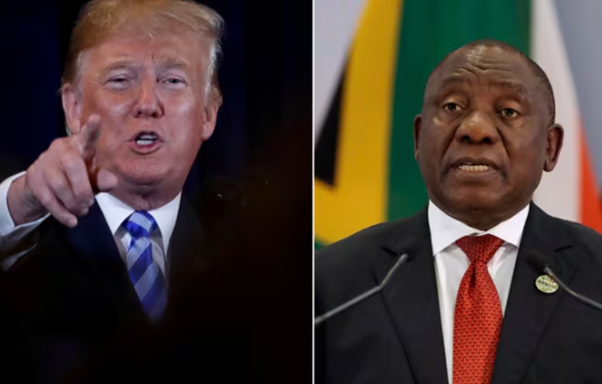The World is ever shrinking due to technology. Within minutes of hearing of former US president Donald Trump’s attempted assassination on the other side of the world, President Cyril Ramaphosa gave his condolences and condemnations.
President Cyril Ramaphosa said the attempted assassination of former US president Donald Trump is a “stark reminder” of the dangers of political extremism and intolerances. Trump was hit in the ear in an assassination attempt by a gunman at a campaign rally Saturday, in a chaotic and shocking incident that fueled political tension ahead of the US presidential election. The 78-year-old Trump was rushed of stage with blood streaked across his face after the shooting in Buttler, Pensylvania, while the shooter and a bystander were killed and two spectators critically injured. Trump raised a defiant fist to the crowd as he was bundled away to safety, and said afterward: “I was shot with a bullet that pierced the upper part of my right ear.”
President Ramaphosa like so many world leaders was right to condemn the attack on president Trump’s life. However, Trump has never been widely respected as a statesman. He has always proven to be a divisive figure. Trump however remains largely popular in the US to run for election again. Ramaphosa for his part clearly wants to warn against the social harm political violence can create. In this era of technology and communication for better or worse ideas spread fast. However, had Trump died, his death would have led to political divisions and controversies that would have sent ripple effects around the world. Trump and Ramaphosa as well as current US President Joe Biden have views on the war in Gaza and Palestine that differ greatly.
Trump is notorious for his close friendship would Israeli Prime Minister Benyamin Netanyahu, while Bident is more or less a traditional supporter of Zionist Israel. Ramaphosa is the official proxy on behalf of the Palestinian Authority for the case against genocide by the Zionist regime in Gaza. Meanwhile President Ramaphosa has his work cut out for him when it comes to setting government policy ahead of the state opening of Parliament.
The announcement by President Cyril Ramaphosa’s office that the opening of parliament would take place on July 18, 2024, confirmed that the Government of National Unity (GNU) discussions have been concluded and the real work would now begin after the mudslinging that characterized the election campaign period. The announcement was welcomed, with euphoria and ecstasy, for various reasons. First, the date coincides with Nelson Mandela’s legacy alive and walking in his footsteps, it must do things differently by putting people first, not politicians’ personal and party interests. Mandela sacrificed a lot for the country. It is incumbent on the seventh administration to emulate him. The best thing it can do is set the agenda for the administration in a rational manner, not make empty promises.
The timing of the State Opening of Parliament or State of the Nation Address (SONA) to coincide would Mandela day is an interesting phenomenon. The president in the aspect of nation building wants to invoke Madiba’s legacy by leading the coalition known as the “Government of National Unity”. However, Ramaphosa needs to compose the agendas of the various parties in the coalition in to one plan of state policy, a doctrine. This will illustrate the government’s intentions over the next five years. But to do this he needs to listen all sides on the issue and the voices of the larger parties are going to be louder than minor parties. The larger parties are of course the Democratic Alliance (DA) and the Inkatha Freedom Party (IFP) in addition to the African National Congress (ANC).
If the ANC under President Ramaphosa can reach a consensus about what policy needs to be taken, then this could provide a path to be taken.
Another matter which makes this opening of parliament important is that it will be the first time the president will open Parliament as leader of the GNU. The fact that putting the GNU together was characterized by differences of opinion, which resulted in the delay in appointing the Cabinet, means that Ramaphosa’s address will not be as casual as his previous ones were when the ANC was the governing party. Third, the fact that Ramaphosa led the ANC to its lowest performance since the 1994 political dispensation, which saw the party obtaining a mere 40% means than his address, he would have to tone down bragging about its successes and the ANC’s performance in the May 29, 2024, general election.
Fourth the fact that Parliament will be sitting at the time when the country’s unemployment rate is so high and when inequality and poverty continue to wreak havoc in the country means that Ramaphosa must be more practical and refrain from telling the nation about an ideal situation and an imaginary Tintswalo that is nothing like the reality on the ground.
President Ramaphosa’s main role in setting up the GNU was to derive legitimacy for his leadership in setting government policy. In a coalition although he would have a difficult time reaching a consensus, he would still have a majority to pass laws through parliament. The president for the first time will have to set out the government’s policies and plans for the year at the helm of a coalition. The coalition is made up different parties each with their own perspective and ideas on how the country can be run. Of course, it is the three largest parties that have to reach a binding agreement on what the government policy will be. Ramaphosa has the final say but will bear the responsibility of balancing the different agendas as the voice of reason.
President Ramaphosa has the heavy responsibility not to indulge in delusions, when the rest of the country does not know when their next meal will come from. The ordinary people in the streets are tired of self-congratulatory stories from the ruling party about how they brought the country back from apartheid and made it prosperous. The time for concrete action as the people of this country cannot worry about an assassination attempt half way around the world.
Article written by:
Yacoob Cassim
Journalist at Radio Al Ansaar






